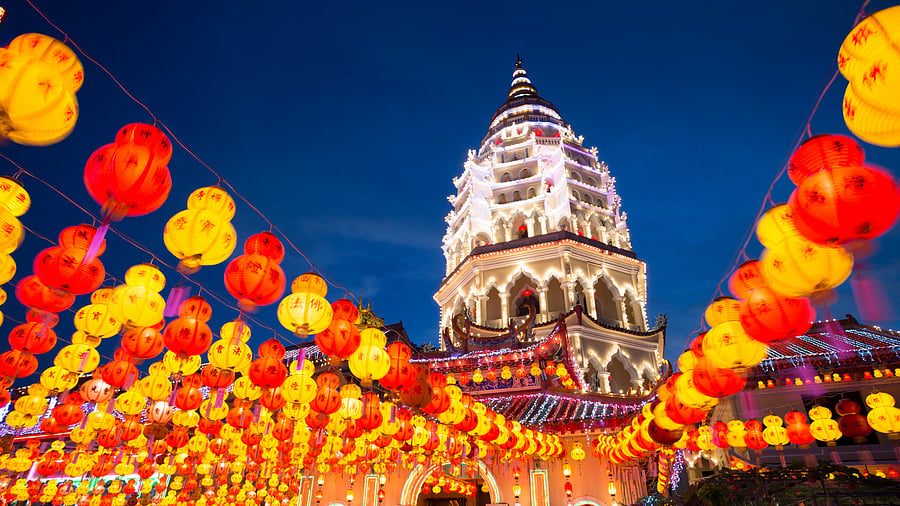
A temple in Penang, Malaysia
Credit: iStock Photo
I had recently been to Penang in Malaysia and was struck by how the three major communities lived in harmony: ethnic Malay Muslims, Indian-origin Tamilian Hindus, and Buddha-following Chinese live their own religious beliefs and cultural practices without fear. Women and men sported vivid symbols of their faith and culture: big red bindis, Baju Kebaya (abaya), Kurung (sarong), and scarves. I wandered around Penang’s capital, George Town, home to Muslim, Taoist, Hindu, and Christian places of worship. Pitt Street here is nicknamed "Street of Harmony" as it has many adjacent to one another.
Affirming my quick impressions, my host Kamini recalled her school days, where a diverse student cohort acknowledged their plurality. Though she studied in a Christian missionary school and had theology lessons, no faith sported any air of superiority. All communities participated in others’ festivals; she herself celebrated Chinese New Year, visited the church every Christmas, and revered the fasting Muslims during Ramadan.
Her workplace employed people from all communities; this was fairly common, she shared. Kamini mentioned that the government had established a ‘Harmony Centre’, which articulated, ‘In a world filled with different beliefs, traditions, and ways of living, it is within our differences that we find beauty’.
Her sharing about the Malay reminded me of the Malayali. The peaceful coexistence of Hindus, Muslims, and Christians is conspicuous in Kerala. Palayam in Thiruvananthapuram has a mosque sharing a wall with a Ganesha temple, opposite a church. Relative to the rest of the country, interfaith marriages are neither rare nor feared. Malayalam movies routinely have Hindu stars playing Muslim and Christian characters, and vice versa.
During Ramadan, temples and churches organise iftar parties for Muslims to break their fast. Recently, the Thrissur Islamic Institute introduced Upanishad studies. ‘Nabi Dinam’, Prophet Mohammed’s birth anniversary, is widely celebrated; temple committees hold receptions for rallies of Muslims, and church leaders visit masjids.
Communism, whose founder critiqued religion as the ‘opiate of the masses,’ thrives in Kerala, with communist governments being democratically elected regularly! Friendships in schools, colleges, and workplaces transcend religious faiths; here, solidarity can triumph over the notion of faith itself.
The cause of such peaceful coexistence seems to be high human development levels, founded on high levels of education. Like the public schools in Malaysia, which are multicultural, the strong Kerala public school system, which includes many government-aided schools run by Christian missionaries, allows no discrimination.
But could the converse possibly be truer—that harmony is the cause of development? Perhaps if we encourage our children to break through their community bubbles and freely make friends from other faiths, ideologies, communities, and genders, it would provide the basis for equitable economic development and social cohesion. A ‘common school system’, where all children attend the local school, may yet establish Vasudhaiva Kutumbakam? Not merely one in which people can choose to celebrate their faith, but one where agnostics, atheists, and those who seek annihilation of caste, creed, and other hierarchical markers can co-exist with believers, learn from one another, and thrive?